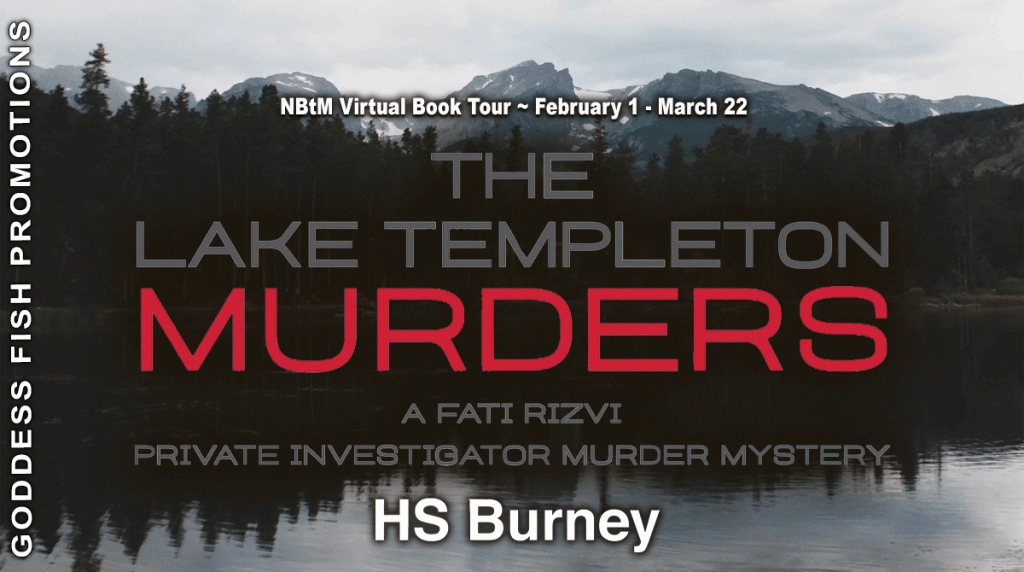This post is part of a virtual book tour organized by Goddess Fish Promotions. HS Burney will be awarding a $20 Amazon or Barnes and Noble GC to a randomly drawn winner via rafflecopter during the tour. Click on the tour banner to see the other stops on the tour.
It took me years from the time I decided to start writing to get to the point of finishing a book. Here is what I’ve learned along the way.
Plotting helps
I know some writers prefer to wing it, but a murder mystery is as technical as it is creative. The story has to follow a logical flow and the clues need to link together and make sense. The timeline has to be meticulously planned out. I plotted out my book in detail before I started writing it, chapter by chapter. Although I didn’t quite get into the minutiae of plotting it scene by scene.
But the story often takes on a life of its own
Despite my ironclad plot, once I started writing the story, it flew in directions I wasn’t expecting. And here I faced a conundrum – do I roughly steer the story back to where I intend it to go or do I let it fly me into kingdoms unknown? I tried to steer it back to shore – but found that the words started to choke off and the writing became stilted. Once I let the story take shape on its own, the writing flowed a lot more smoothly. Words came easily and a new life was breathed into the book.
Be entertaining but don’t stretch the bounds of credulity
To have an engaging story, you need to create entertaining and colorful characters, situations, and worlds. But, unless you’re writing fantasy, they still need to have a connection to reality. The actions of your characters need to make sense. They need to be consistent with the character traits you’ve painted. Don’t make your police force out to be idiots. Police today have access to all kinds of technology – phone tracing, DNA identification, facial recognition. I recently read a story where the police assumed a burned dead body was a certain victim just because of gender and height. No attempt was made to run DNA or dental records. The story was set in 2020. It left me feeling angry and cheated. Don’t do that to your reader. Don’t take the easy way out.
Be prepared to edit extensively
Editing is my least favorite part of the writing process. But without it, you have no story. I found endless fallacies, mistakes, inconsistencies, and even grammatical errors in my work through my several rounds of editing. Don’t rely solely on your editor. You need to feel comfortable that you’ve put your best work forward before you engage a professional editor. Don’t skip this step.
But most importantly, have fun! Writers write because we derive deep inner satisfaction from creating stories. Don’t lose sight of that through the process.
A body washes up on the shores of Lake Templeton, a small town on the coast of Vancouver Island. Sharon Reese, the victim, was a dedicated government employee. Everyone liked her, but no one knew much about her. Was she hiding something? Maybe a questionable past riddled with scandal. And did it lead to her plunge to death, in a drunken stupor, off the dock outside her secluded lakefront lodge?
Was it an accident? A suicide? Or cold-blooded murder? Private Investigator, Fati Rizvi, is determined to find out.
Fati arrives in Lake Templeton to find secrets that run as deep as the City’s sewers. Everyone is hiding something and nothing is as it seems. A cult escapee. A corrupt politician. A struggling airline. A multi-million dollar public-private project to revitalize the Lake Templeton waterfront. How are they all connected?
As Fati valiantly unravels the knots, another body is found on the shore. Is it the same killer? And can Fati stop them before they strike again?
Enjoy an Excerpt
It was these waves that carried Sharon once the water besieged her lungs and she stopped breathing. Maybe her killer was hoping that the body would descend to the depths of the ocean, swallowing its secrets. It must have been a rude shock to see the evidence of their crime splashed across the morning papers.
Sharon’s body was half-reposed face-down on the wet sand, deposited on the shore like plastic waste. Clumps of hair were caught in the jagged rocks that edge the receding land, one bloated arm flung over a large boulder, as if trying to find a grip. Her legs floated behind her like windsocks. Silk shirt ballooned over the surface of the water like a parachute.
The crime scene has been cleared up. Culver Beach sparkles in the vestiges of the sinking sunlight, sand glinting like diamond dust. The only remnants of the morning’s tragic discovery – dried boot prints in the grassy sand, left behind by the police.
The nearest house is walled off by a thicket of trees and is currently empty, owned by a businessman who only spends a few months here in the summers. The beach is quiet, with not even a dog walker in sight. I walk on the sand for a few minutes, shoes in hand, reveling in the quietude. I breathe in the fresh air, slightly briny, and crisp enough to open up my nasal pathways.
No answers will be found here. Not for me.
Sergio’s house hibernates, squeezed in the warm hug of the thicket of trees that surround it. They’re evergreens so they hold on to their leaves, even in winter, until the whistling wind snatches them away and showers them on the lawn. Despite Sergio’s gallant efforts with the rake, his driveway is again covered in shrubs and branches.
I pull up behind Sergio’s car, parked in its usual spot in the driveway, the mud cracked and crusting on its back tires, windows streaked with messy wet tracks made when rain intermingled with dust. The killer must have picked him up and driven him to Pebble Beach.
Detective Singh’s police cruiser is parked neatly angled to the side of the road. As I approach the house, I see a shattered window in the front.
I haven’t seen young children living in the neighbourhood. Most houses in Sergio’s vicinity belong to empty-nester retirees and snowbirds. Was this an accident or something more sinister? Did someone smash Sergio’s window?
At the foot of Sergio’s porch stands his city recycling box. It’s filled to the brim with plastic containers and folded up cardboard boxes, as if Sergio had just finished cleaning and decluttering. I move closer for a better look. An empty bottle of Tito’s vodka, several Amazon boxes, soup cans, and yogurt containers. A box for a Blackmagic Design pro camera that costs almost thirteen thousand dollars. A black rectangular tube that housed a Chanel snowboard.
How much was the City paying Sergio?
Zed and I arrive after ten p.m. We park in an underground lot a few blocks away. Granville Street at night is a cornucopia of debauchery. Drunk girls totter on heels and too-tight skirts, giggling and holding each other. The heavy smell of sweat mixed with marijuana mixed with alcohol hangs in the air like a toxic thundercloud. The sidewalk is sticky with spilled drinks and other substances you don’t want to think about. Bedraggled bums cluster in dark corners, their life’s possessions gathered at their feet in duffel bags. They panhandle, lighting their pipes, smoking their cigarettes, and shooting their heroin without apology.
The street is dotted with black-doored establishments that advertise their presence with glowing signs and glowering bouncers. At the most popular clubs, lines of partygoers stretch, smoking cigarettes while waiting for entry. Zed and I blend into the shadows, two travelers that don’t quite belong but don’t stick out either.
This is Caleb’s world. In contrast, the clean-cut Sergio snowboarded on weekends and went running every morning. They had nothing in common besides their desire to sing. And it was this commonality that led their worlds to collide so painfully.
At Legends, the thrum of the music wafting from behind heavy curtain and chain gives away the mayhem brewing inside. The roasting interior is awash in flashing lights. The smell of stale beer and rank sweat overpowers me. I choke back my gag reflex.
Caleb is not hard to find. He is huddled with other youth, all misty eyes and lost faces, in a chemical-induced otherworld.
About the Author:  HS Burney writes fast-moving, action-packed mysteries set against the backdrop of majestic mountains and crystalline ocean in West Coast Canada. She loves creating characters that keep you on your toes. A corporate executive by day and a novelist by night, HS Burney received her Bachelors’ in Creative Writing from Lafayette College. A proud Canadian immigrant, she takes her readers into worlds populated by diverse characters with unique cultural backgrounds. When not writing, she is out hiking, waiting for the next story idea to strike, and pull her into a new world.
HS Burney writes fast-moving, action-packed mysteries set against the backdrop of majestic mountains and crystalline ocean in West Coast Canada. She loves creating characters that keep you on your toes. A corporate executive by day and a novelist by night, HS Burney received her Bachelors’ in Creative Writing from Lafayette College. A proud Canadian immigrant, she takes her readers into worlds populated by diverse characters with unique cultural backgrounds. When not writing, she is out hiking, waiting for the next story idea to strike, and pull her into a new world.























